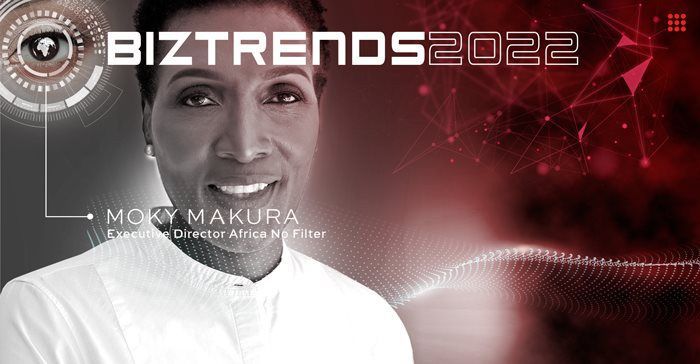#BizTrends2022: Moky Makura - The Future of Media - Hard Data, Soft Stories

Speaking at the virtual conference, scheduled to take place on 2 February 2022, Moky Makura will share a taster of what delegates can expect from her executive trend presentation on how storytelling creates new opportunities for better engagement with audiences at BizTrends 02.02.2022
Can you share a bit about what audiences can expect from your presentation
I’m excited to be speaking about the power of storytelling especially when it comes to how brands can apply it to get better engagement. We are seeing a trend in the type of content that consumers are looking to consume on digital platforms. Traditional publishers are still focused on business and hard news and sports, which are important, but we’re seeing that more engagement with softer stories; the people stories that really identify the commonalities that we all have.
You are the executive director of No Filter, a donor collaborative focused on shifting the African narrative. What was the inspiration / motivation behind Africa No Filter?
For many years stories about the continent have been written with specific frames that are negative and not terribly reflective of a progressive and contemporary continent. Many stories are written through the lens of poverty, corruption, conflict poor leadership and disease - and these frames result in narratives about a continent that is broken and dependent and inhabitants that lack agency.
Narratives matter because they inform perceptions and influence behaviour.
These stereotypical narratives have an impact - on investment into the continent, on migration out of the continent ,on relationships between countries in Africa, and on many other things. That’s why Africa No Filter exists.
Africa No Filter was created when a group of US and UK funders came together led by the Ford Foundation. As the first executive director it is my job to turn the vision and mission of No Filter into a reality.
We are the one organisation set up to build a community around this shared mission of decolonising narratives about Africa.
How have you seen the African narrative change or not change since you worked at the Bill and Melinda Gates Foundation and starting Africa No Filter?
There are pockets of progress. Currently, we are seeing how the African story is increasingly being shaped by pop culture - our music, films, sportsmen, and entrepreneurs.
The narrative is changing from “Africa is not only the place of conflict and poverty, it’s also where cool music is created”. But underlying this progress there are still racist and colonial undercurrents, and we can still see stark examples of where old narrative and attitudes about Africa continue. We can see it in the storytelling around civic generally and specifically.
Take Omnicom, the new variant which is being touted as a variant from Africa. It led to travel bans. This is just one recent example of how a colonial and superior attitude to Africa informs behaviours and policy. So there is still a lot of work to do to support and create stories that counter the current narratives.
Are there any key lessons you’ve learnt along the way?
I have learned that it’s up to us as Africans to represent the continent we see. But it’s also important to celebrate and find ways to continue to tell our stories in a way that reflects a progressive continent.
What is your favourite/least favourite social media platform, especially in terms of spreading the African narrative?
I’ve chosen Twitter as my favourite platform largely because it forces you to be concise and precise.
What media, literature, music, movies, cultural references etc do you go to on a regular basis?
Podcasts are my default platform for cultural content. I listen to podcasts focused on storytelling. I love finding gems, especially audio documentaries or stories that inform and educate as well as entertain. It’s scary how much there is out there. But I’m also now creating my own podcast to add to what is already out there.
Get in touch to come on board for BizTrends sponsorship in your industry or category or as BizTrends Event sponsor at moc.ytinummoczib@selas.
Visit BizTrends Special Section
Event: BizTrends2022
Date: Wednesday, 02 February 2022
Time: 13h00 – 17h30 with tea break
Location: Virtual
Price: R150 per head; 25% discount for bookings of five or more. Students are free.

About Danette Breitenbach
Danette Breitenbach is a marketing & media editor at Bizcommunity.com. Previously she freelanced in the marketing and media sector, including for Bizcommunity. She was editor and publisher of AdVantage, the publication that served the marketing, media and advertising industry in southern Africa. She has worked extensively in print media, mainly B2B. She has a Masters in Financial Journalism from Wits.Related
Stop being marketers... Start being storytellers! 20 Mar 2025 #BizTrends2025: Vodacom’s Andisa Ntsubane – The anatomy of winning brands in 2025 22 Jan 2025 Data: The lifeblood of effective PR in an age dominated by information 19 Dec 2024 3 key considerations in harnessing curiosity in marketing 11 Dec 2024 South Africa’s Good Things Guy, Brent Lindeque hosts MTN Win-Win Summer campaign weekly show 2 Dec 2024 Cassava Technologies CMO Ifeoma Jibunoh went from beers to broadband 18 Nov 2024









































